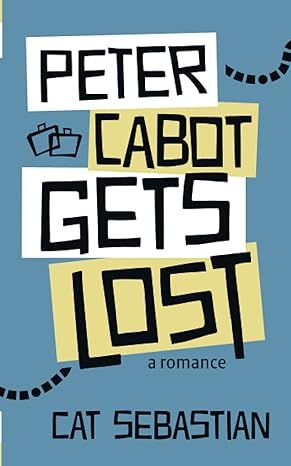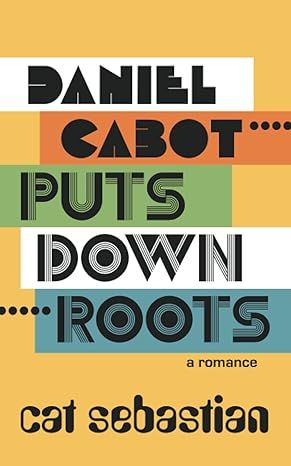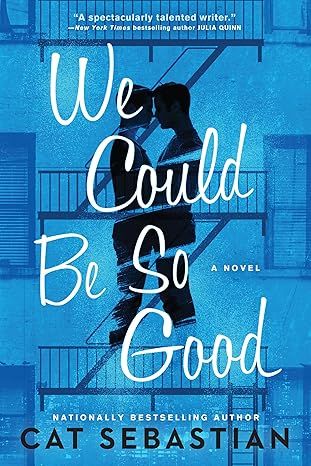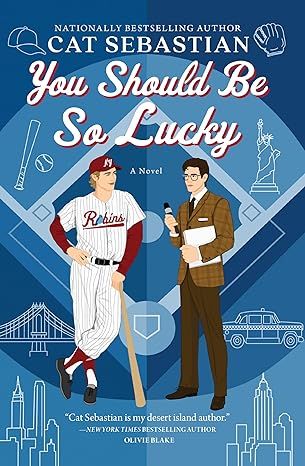Peter Cabot Gets Lost (The Cabots)
4.6
-
863 ratings
Summer 1960: After years of scraping by, Caleb Murphy has graduated from college and is finally getting to start a new life. Except he suddenly has no way to get from Boston to Los Angeles. Then, to add to his misery, there’s perfect, privileged Peter Cabot offering to drive him. Caleb can’t refuse, even though the idea of spending a week in the car with a man whose luggage probably costs more than everything Caleb owns makes him want to scream.
Peter Cabot would do pretty much anything to skip out on his father’s presidential campaign, including driving across the country with a classmate who can’t stand him. After all, he’s had plenty of practice with people not liking him much—his own family, for example. The farther Peter gets from his family’s expectations, the more he starts to think about what he really wants, and the more certain he becomes that what he wants is more time with prickly, grumpy Caleb Murphy.
As they put more miles between themselves and their pasts, they both start to imagine a future where they can have things they never thought possible.
Kindle
$5.99
Available instantly
Audiobook
$0.00
with membership trial
Paperback
$12.00
Ships from
Amazon.com
Payment
Secure transaction
ISBN-13
979-8544152309
Print length
210 pages
Language
English
Publisher
Independently published
Publication date
September 09, 2021
Dimensions
5 x 0.48 x 8 inches
Item weight
7.5 ounces
Frequently bought together
Product details
ASIN :
B09FSCJQ9K
File size :
1692 KB
Text-to-speech :
Enabled
Screen reader :
Supported
Enhanced typesetting :
Enabled
X-Ray :
Not Enabled
Word wise :
Enabled
Sample
Day 1
Cambridge, Massachusetts, 1960
There was something deeply pathetic about lingering in town for days after graduation, but Peter Cabot had long since made his peace with being deeply pathetic.
He had packed up the trunk of his car, then unpacked it when he realized he couldn’t fit everything inside, then taken half his belongings to the Salvation Army because the idea of mailing them to the family home in Cape Cod would mean admitting he had to actually go to the family home in Cape Cod, then repacked his trunk. He helped his friends pack. He helped his favorite professor change offices. And now his lease was up and he had run out of excuses to stick around.
All that was left was to drive out to Cape Cod, resist the urge to gouge his eyes out or drive off a bridge, and then join the rest of the family on the campaign trail. It was nothing he hadn’t done before, although the last time his father had only been running for Senate. A presidential campaign meant not only five months of playacting as the world’s least convincing dutiful son, but the added horror of his awkwardness being aired on national television and appearing in the pages of Life magazine.
With a sense of acute dread, he got ready to close the trunk and slide behind the wheel.
Then, somewhere up the street, he heard the sound of a phone’s handset being slammed into the receiver and instinctively looked up. A few cars’ lengths away, beside a phone booth, stood a boy with blond hair, one hand covering his face. But Peter didn’t need to see his face to know who it was. He had spent long enough staring at Caleb Murphy, God help him, to be able to recognize him by the hair alone.
Peter considered ignoring him. Nobody wanted to be caught crying, and that was definitely what Caleb was doing behind his hand. There was just one shake of his shoulders, but it gave him away. On the other hand, Peter could hardly just drive off, leaving the kid crying on the side of the street.
He sighed and made his way down the sidewalk. However embarrassing this was, it wasn’t like they’d ever see one another again.
“Hey,” Peter said when he was about a yard away. Caleb didn’t look up. “Hey, Caleb.”
Caleb looked up, scowling despite his red eyes and tear-stained cheeks. “You,” he said, managing to imbue that syllable with a heaping dose of anger and scorn. “What do you want?”
“I, um, is something the matter?”
Caleb let out a wild laugh. “No, I just get a kick out of crying on sidewalks, don’t you? Doesn’t everyone? Go away.” He scrubbed roughly at his face with the cuff of his shirt and Peter suppressed the urge to hand him a handkerchief.
“I really can’t.”
“Oh fuck off.”
Peter was faintly surprised to hear that sort of language from Caleb. He seemed above profanity, somehow. “Look, just.” He broke off, running a hand through his hair. “I really don’t want to leave you alone like this. Is there someone you can call? Is there anything you need?”
“Ha! A bus ticket to Los Angeles. Have one handy?”
Peter took stock of the two battered suitcases by Caleb’s feet, the worn knees and frayed collar of his otherwise immaculate clothes. “No,” he said. He didn’t know if it was the old luggage or the tears or a desperate urge to do anything other than drive east that made him speak up, just that it was out of his mouth before he could second guess himself. “But I’m about to head in that direction.”
“In that direction,” Caleb scoffed. “What, westward?”
“To Los Angeles,” Peter said. “I’m visiting my aunt. Do you want a ride?”
“I don’t want your charity, Cabot.”
“It’s not—look, we can split the gas.”
Caleb regarded him with narrowed, flinty eyes, a look Peter remembered from the few classes they shared. Peter resisted the urge to squirm. “I can drive part of the way,” Caleb said finally.
Peter nearly responded that over his dead body was he letting anyone drive his car but decided they could argue about that later. He had a sense this trip would involve a fair amount of arguing. It could involve three thousand miles of uninterrupted bickering and it would still be better than his parents’ quietly simmering disappointment, though, and Peter welcomed it with the closest thing to hopeful anticipation he had experienced in months.
“Great,” Peter said. “Hop in.”
Boston, Massachusetts to Albany, New York
Caleb was going to kill his sister. If she could have broken her leg next week, or—here was a thought—just not broken it at all, then his mother might have wired him the money she meant to pay him back.
“It’s fine,” Caleb had told her. “Totally fine! I have a plan B.” He did not have a plan B. He barely had a plan A. He had been living on noodles since Easter, and now Judy had to go and fall off a goddamned fence and Caleb was going to be stuck in a car with Peter fucking Cabot for days.
He knew he was being impossible; he knew this wasn’t Judy’s fault for breaking her leg, or his mother’s for never having any money, or even Peter’s for being such a fucking gentleman that he couldn’t leave Caleb crying in peace. It was his own fault for relying on anybody but himself. If he had worked a second job then he might have had more money put aside, but he was so tired, and so tired of being tired.
Now Peter was rummaging through the trunk of his car, which contained a couple of cardboard boxes in addition to a matched set of soft-looking blue leather luggage that had Caleb wanting to defect to the Soviets. As he watched, Peter took out a box labeled “records” in sloppy capitals and another box labeled “books?” and put them on the curb.
“You’re just going to leave them there?” Caleb asked, scandalized.
“This time of year, the sidewalks are filled with things students leave behind. Someone will be able to use or sell them.” Peter gestured up and down the sidewalk, which was indeed littered with boxes and odd bits of furniture. And, yes, somebody would obviously come along and take everything off to a secondhand shop, but Caleb hated the reminder that Peter could afford to just leave his belongings on the street as trash.
Also, the question mark at the end of “books?” made him feel unhinged, because how much doubt could there really be? How completely incompetent did a person have to be in order to not know what he had just put in a box?
“You wanna give me those?” Peter asked, gesturing at Caleb’s suitcases.
“No,” Caleb snapped, and shoved his luggage into the trunk. Then he went to the passenger side and slid in, conscious that he was acting like a brat but not really having the energy to act any other way. It was stupidly satisfying to lash out at somebody, especially somebody like Peter Cabot who couldn’t be hurt one way or the other.
He sat silently—sulking, he supposed, was technically what he was doing—while Peter made his way out of Cambridge and into the Boston traffic toward, Caleb presumed, the turnpike. Despite having lived here for four years, Caleb only had the vaguest notion of Massachusetts geography. He only had the vaguest knowledge of geography, period, but that was only because maps were the devil’s work. But that meant he’d have to trust that Cabot knew what he was doing, and Caleb hated trusting people, especially people like Peter Cabot.
Still, Cabot seemed to be a competent driver, and when he followed a sign reading “Massachusetts Turnpike, West,” Caleb figured he could at least be trusted to point the vehicle in the general direction of California.
Caleb shifted in his seat and cursed himself for leaving his books in his suitcase because now he had nothing to do but stare out the window and seethe. Cabot tuned the radio to the broadcast of a baseball game in which Caleb had no interest whatsoever, and regardless of how rude Caleb was being, he wasn’t rude enough to ask a man to change the station in his own car.
It was two in the afternoon by the time they left Boston behind them, and Caleb hadn’t eaten breakfast, let alone lunch. Only the rumble of the car’s engine covered up the embarrassing noises his stomach was making, so he was relieved when Cabot casually asked if Caleb minded stopping for an early dinner. “I thought I could wait for dinner, but I’m starved,” Cabot said, with a nervous laugh as if he shouldn’t admit to such a plebeian requirement as food.
“Fine,” Caleb said.
“There’s a Howard Johnson’s in a couple of miles,” Cabot said. “Is that okay?”
“It’s fine,” Caleb said.
When they got out of the car, Cabot rolled his neck and stretched his shoulders as if he had spent the past few hours at crew practice—Caleb hated himself for knowing that Peter Cabot did things like crew, but there was no avoiding that kind of knowledge about someone like Cabot, one acquired it through some complicated process of social osmosis—rather than sitting in a car. Caleb, by contrast, primly dusted off his slacks and opened the door to the diner, pointedly waiting for Cabot to join him.
A waitress in a blue uniform led them to a table where Cabot ordered two hamburgers with extra fries and a milkshake and Caleb ordered a frankfurter that cost 35 cents and a glass of water. Cabot had better not plan on splitting the check down the middle, that much was for sure. When the food came, Caleb greedily ate his hot dog and the french fries that came with it, and by the time his plate was empty, he felt better. It was always annoyingly predictable that he felt less ornery after a decent meal. He might have thought that by now he’d have made the connection between an empty stomach and a bad temper. Maybe one day he’d be able to eat before he was half starved, and without weighing pennies and nickels against the gnawing in his gut.
“My God, I was hungry,” Cabot said, shoving his plate away from him.
Caleb said nothing, because Cabot didn’t look like he knew the meaning of the word. There was no way he had missed a meal in his life. He sure didn’t look it. Despite himself, Caleb let his gaze drift to the breadth of Cabot’s shoulders and the suggestion of muscled biceps beneath the rumpled cotton of his oxford shirt. Then he noticed that Cabot had only eaten half his fries.
“You still have food left,” Caleb said, and then immediately wanted to bite his tongue. It was no business of his if Cabot left food on his plate, and he didn’t like having hinted that it mattered to him. Caleb knew how to behave among rich people, for heaven’s sake; he hadn’t spent the past four years at Harvard for nothing. It was just that being on the phone with his mother made all that stuff float to the surface, just like it made his accent come out. He hated that he had let Cabot get to him. But if Cabot thought that Caleb was acting strange, he didn’t betray it.
Cabot shrugged. “You can have them if you want. The second hamburger and the milkshake were kind of overkill. My eyes were bigger than my stomach,” he said sheepishly.
That startled a laugh out of Caleb. “My mother says that.”
“All mothers say that.”
Caleb had thought that the Cabots wouldn’t refer to anything so vulgar as a stomach. They probably dined in a vast marble hall, eating caviar off of plates that were trimmed in gold. Caleb’s notions of how the very rich lived in their native habitats were entirely based on what he had seen in the movies. His friends were mainly the kids of doctors and lawyers, which was plenty rich as far as Caleb was concerned, an entire world away from how he had grown up, but also a world away from people like the Cabots.
Somehow, the plate of fries was now in front of him, and he couldn’t have said whether he had pulled it across the table or whether Cabot had pushed it. Either way, Caleb was eating them, dipping fries into the puddle of ketchup on the side of the plate.
When the check came, Cabot put three dollars on the table, which more than covered both their meals. Caleb bristled. He had had enough of being a charity case and wasn’t going to tolerate it from Peter Cabot. Eating french fries so they didn’t go to waste was one thing; letting someone pay for your dinner was something else altogether.
“That’s too much,” Caleb snapped.
“Oh,” Cabot said. He wasn’t exactly blushing, but he looked caught out. “I—how much should it be?”
Caleb sighed. He handed one of the dollar bills back to Cabot and put down forty-one cents for his own share—thirty-five for the food, and a fifteen percent tip that he rounded up to six cents. “Your meal was $1.70. Your tip is a quarter, bringing your total to $1.95. You put down two dollars, so I owe you five cents.” He picked up one of the nickels that he had placed on the bill and held it out to Cabot.
“Uh,” said Cabot. “Leave it for the waitress.”
“That would be an eighteen percent tip,” Caleb pointed out.
“I don’t usually count it out like that. I just make sure I’m leaving at least fifteen percent.”
Caleb realized that the three dollars hadn’t been meant to cover his own meal, but to provide the waitress with a substantial tip. “Three dollars would have been almost a seventy-five percent tip.”
“It’s only an extra dollar.”
Caleb felt his face turning red and hated Cabot for it. “Only a dollar,” he repeated.
“I mean, I know it’s a lot for some people. It’s probably a lot for the waitress. But it isn’t for me.”
“You can’t throw your money around like that.”
That, somehow, was the wrong thing to say, because Cabot, for the first time that day, the first time in the four years Caleb had been acquainted with him, lost his facade of good humor. “I’m not throwing it around. I’m using it. It’s mine to use, and if I want to give it all to diner waitresses, then that’s what I’ll do, and it isn’t your job to tell me otherwise.”
“But why—”
“I’m trying not to be an asshole!” The words came out far louder than Cabot could possibly have intended, and Caleb felt judgmental gazes from several tables around them.
“Fine,” Caleb snapped, and got to his feet, figuring he could wait at the car while Cabot did whatever the hell he fucking pleased with all his money.
Read more
About the authors
Cat Sebastian
Cat writes queer historical romance. In her spare time she acquires too many houseplants and misplaces things. She lives in a swampy part of the American south but also on twitter.
Visit Cat at CatSebastian.com
Reviews
Customer reviews
4.6 out of 5
863 global ratings
Jessa
5
Extremely charming
Reviewed in the United States on December 16, 2023
Verified Purchase
I absolutely love the character dynamics. Both of them insecure in different ways, Peter self-effacing and Caleb aggressive. And they’re so sweet together. So thanks for asking me to read this Chaya even if I am allergic to non speculative fiction.
Don M. Hulbert
5
Charming
Reviewed in the United States on August 22, 2023
Verified Purchase
As Cat Sebastian said in the Acknowledgements (I think), the entire plot is a journey across the US. It's also a journey of a couple towards creating a life together in the rather hostile environment of the 1960s. The characters and dialogue were involving and believable. I was roped in immediately!
Bo
5
Totally Unique Series
Reviewed in the United States on December 6, 2022
Verified Purchase
This review applies to each of the three in this series about members of three generations of the Cabot clan of Massachusetts, who are wealthy and politically successful. No, it doesn't even touch what you might have expected--it's not about THAT political family from Massachusetts.
But Tommy, Peter and Daniel, the three main characters that author Cat Sebastian present to us turn out to be more interesting than you might expect, and their stories are a total departure from those you might have imagined for the decades in which they are set.
This is an extraordinary series, beautifully written, historically accurate, and one that if you like the first one you are likely to get the other two, pronto.
Bravo!
Read more
Sarah
5
Steamy and tender and realistic
Reviewed in the United States on January 31, 2024
Verified Purchase
I read a lot of books in this genre and this is a real standout for me. The characters are so well drawn and the way they fall in love is so real and relatable. Cat Sebastian manages to explore their insecurities with humor and without angst. The steamy scenes are nice and steamy but also tender and advance the plot. This book is a warm hug. Read it!
Read more
kat468
5
LOVE. Love love love love love.
Reviewed in the United States on April 22, 2024
Verified Purchase
This is the softest, kindest, most gentle book in all the right ways. It’s a lovely romance, which is great and why I picked it up. But it’s also about striking out on your own, feeling adrift in your life and figuring out how to create autonomy and make decisions for yourself. It’s about class differences and self sufficiency and learning to accept kindness without guilt. It’s about setting boundaries and creating your own self worth. I saw so much of myself in both Peter and Caleb at different points, I think I highlighted half the book.
Read more
Top Cat Sebastian titles
View allBest Sellers
View all
The Tuscan Child
4.2
-
100,022
$8.39

The Thursday Murder Club: A Novel (A Thursday Murder Club Mystery)
4.3
-
155,575
$6.33

Sapiens: A Brief History of Humankind
4.6
-
140,302
$13.49

The Butterfly Garden (The Collector, 1)
4.3
-
88,556
$9.59

Things We Hide from the Light (Knockemout Series, 2)
4.4
-
94,890
$11.66

The Last Thing He Told Me: A Novel
4.3
-
154,085
$2.99

The Perfect Marriage: A Completely Gripping Psychological Suspense
4.3
-
143,196
$9.47

The Coworker
4.1
-
80,003
$13.48

First Lie Wins: A Novel (Random House Large Print)
4.3
-
54,062
$14.99

Mile High (Windy City Series Book 1)
4.4
-
59,745
$16.19

Layla
4.2
-
107,613
$8.99

The Locked Door
4.4
-
94,673
$8.53




